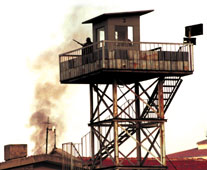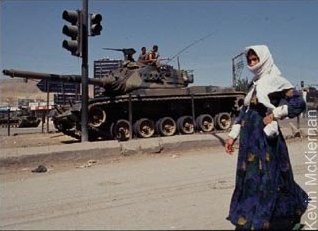20
April 2001
![]()
2. "Turkish Hunger Strikers Dying",
after months of surviving on sugared or salted water, Zehra Kulaksiz
lies on a cot in a makeshift house in the poor outskirts of Istanbul
with barely the strength to talk.
3. "US waiting for action", the US
State Department said that it was waiting for Turkey to implement the
economic measures it had announced.
4. "Turkey shelves tank upgrade amid fiscial crisis", Turkey has shelved plans to upgrade Leopard-1 tanks amid the nation's fiscal crisis.
5. "Ankara: No step back with
policy on Iraq", as Ed Walker is expected to arrive in
Ankara on Friday amid wide expectations for foreign financial support,
Turkish officials say Turkey should not be expected to take steps backward.
They say, 'Foreign policy is a give and take business'
6. "Czech FM denounces Turkey's tough talk on Cyprus
joining EU", the Czech Republic on Thursday warned Turkey
not to underestimate the European Union's resolve to accept fellow candidate
Cyprus as a member, no matter whether or not the island is reunified.
1. BBC - "Deal rejected in Turkey hunger strike":
Fourteen people have starved themselves to death
A senior Turkish Government minister has suggested easing prison
isolation rules in a bid to end the prison hunger strike which has claimed
the lives of 12 inmates and two supporters.
Hundreds of jailed left-wing militants have joined the death fast over
plans to move them from dormitory-style accommodation to cells, where
they fear they will be at greater risk of abuse from prison officials.
Justice Minister Hikmet Sami Turk now says that - although he still
wants to move the prisoners to cells - he is putting forward a bill
to enable them to meet for educational, social, cultural and sports
activities.
But the offer has been rejected as inadequate by a leading
human rights activist.
"It is not progress, but a more sophisticated and refined regime
of isolation," Yucel Sayman, the head of the Istanbul Bar Association,
told the French news agency AFP.
Prisoners jailed under terrorism charges are currently kept in their
cells and not allowed to mix together, and the government had hoped
that ending the isolation might provide a breakthrough in the deadlock.
The government insists that its central plan - to move away from dormitory-style
systems - is not negotiable.
It blames the dormitory system for the high levels of hostage-taking
and rioting in Turkey's prisons.
But inmates claim that the new cells, housing a maximum of three people,
will put them at much greater risk of torture and beating.
Mr Turk has also pledged to improve prison "transparency".
He is putting forward two other bills to improve prison complaints procedures.
"With these draft bills, we will establish transparency in prisons,"
he said.
And he renewed his appeal for the hunger strike to be called off.
"I appeal to the prisoners, their families and civic groups once
again. The deaths must stop. The protest must end before it is too late."
Turkish security forces attempted to break the protest by storming prisons
last December, but the hunger strike has continued. ![]()
2. - AP - "Turkish Hunger Strikers Dying":
ISTANBUL
After months of surviving on sugared or salted water, Zehra Kulaksiz
lies on a cot in a makeshift house in the poor outskirts of Istanbul
with barely the strength to talk.
On the wall above her head is a picture of her 19-year-old sister, Canan,
who died of starvation Sunday to protest the treatment of leftist inmates
in Turkey's prisons. The prisoners have been transferred to new cells
where they are isolated and, according to their families, beaten daily.
``We want to show the outside world how people die in the cells,'' said
Kulaksiz, a pale 22-year-old economics student who now weighs only 86
pounds.
Despite the deaths of 14 hunger strikers, Turks and most in the West
are largely ignoring the plight of Kulaksiz and 230 other fasters, including
222 prisoners loyal to left-wing groups.
Turks instead are focusing on a crippling domestic economic crisis and
have little sympathy for radical leftist militants suspected of organizing
the hunger strikes to give prominence to their cause. And there has
been little reaction in Europe, possibly because the leftist militants
are not popular there.
International human rights groups, however, have urged Turkey to end
its policy of isolating prisoners, which they say harms mental and physical
health.
``The state will not bow its head under pressure from those who force
their own friends to die,'' a defiant Prime Minister Bulent Ecevit said
Thursday.
The strikers, however, are convinced that their plight - and if necessary
their death - will make a difference.
In 1996, 12 inmates starved themselves to death before the government
abandoned plans to transfer prisoners to remote jails where they faced
solitary confinement.
``If people don't die, nothing changes in this country,'' said Resit
Sari, who has been fasting since December. He lives in a small house
along with Kulaksiz and three other strikers.
Hunger strikers like Kulaksiz and Sari suffer from severe weakness,
insomnia and muscle and stomach pains. Although they prolong their lives
by drinking water with salt, sugar and lemon, protein drinks and sometimes
eating a little food, they eventually go blind and later die.
Most of the hunger-striking prisoners are convicted members of the outlawed
Revolutionary People's Liberation Army-Front or similar armed Marxist
organizations that have claimed responsibility for scores of attacks
and assassinations over the past decade.
``The public has not looked upon this phenomenon with sympathy. They
think it is a project of terror groups,'' said Ilter Turan, political
scientist and dean of Istanbul's Bilgi University.
In the old prisons, leftist inmates lived a communal life in large dormitory-style
wards. Each political group controlled its own ward, where inmates were
given physical and political training. When soldiers raided 20 prisons
throughout the country in December, inmates resisted for four days with
guns, makeshift flame-throwers and fire-bombs. The clashes left 30 inmates
and two soldiers dead.
Turkey's media have concentrated on an economic crisis that has seen
thousands of bankruptcies and more than a half-million layoffs. Coverage
is also sparse because a court in December banned the broadcast or publication
of statements from outlawed leftist groups.
Some analysts say that the determination of leftist organizations to
resist the transfers may also stem from the fact that the prisons had
become their main power base since more members were inside jail than
outside. There are only a few thousand members of armed leftist groups
in Turkey.
``Through the transfer, they lose that power base within the prison
system and their manipulative power over the members,'' said Dogu Ergil,
political science professor at Ankara University.
On Thursday, Justice Minister Hikmet Sami Turk said that the government
was drafting laws that would allow prisoners in small cells - one to
three people - to participate in communal activities and would permit
civilian inspections of prisons. The leftist prisoners want to return
to the ward system, but Turk and Ecevit have ruled that out.
With the standoff continuing and hunger-striking prisoners dying - the
last death was Wednesday - human rights groups are expressing hope that
a compromise can be reached.
Fatma Sener, a 22-year-old student, says she'll only give up her 156-day
fast if the prisoners announce the ``victory of the inmates.'' ![]()
3. - Kurdish Observer - "US waiting for action":
The US State Department said that it was waiting for Turkey to implement
the economic measures it had announced. The US State Department said
that it greeted the announcement of the main pillars of Turkey's new
economic program with pleasure and the it was waiting for Turkey to
implement these measures.
WASHINGTON 
State Department spokesman Richard Boucher said the following concerning
Turkey's economic situation during a press conference he gave: "The
basic elements of a strong new economic reform plan were announced on
Saturday. This program contains important steps for Turkey's economy
to achieve stability and for institution of sustainable public finance.
The US government, Treasury, and International Monetary Fund [IMF] announced
that they support this program. Now, we are waiting for these measures
and other necessary measures to be implemented. We know that the Turkish
government is also working on a new legal package including reforms.
We are assisting Turkey. This year we secured USD 2.8 million for Turkey
for international and military education. We announced that we support
the program."
'Let Turkey quit looking for foreign enemies'
Mark Parris, the former US Ambassador to Turkey, said that if Parliament does not pass the economic package prepared by Kemal Dervis and implement the laws, it would pay a greater price. "If the parliament and government take the necessary steps, Turkey will return to a strong economy again in the coming months," Parris said.
Response to MHP
By giving open support to Dervis, Parris virtually answered back to Nationalist Action Party (MHP) deputy Mehmet Gul's unbecoming comments about Dervis, to the effect that, "He's a Mason. His mother is an infidel. He's about as dishonorable as you can get." Parris stressed that it was very wrong to hold the IMF or imaginary foreign enemies responsible for the latest economic crisis. "Playing the nationalism card might secure profit for partisans in the short term," Parris said, adding: "But for Turkey to improve economically, it is necessary to implement Dervis's program as quickly as possible." Gul had made insulting comments about Dervis on Kanal 7, when he thought the cameras were off. A number of circles interpreted Gul's comments as the MHP's view of Dervis.
Parris spoke at the Washington Institute, which is located in the US capital, the other day at a special conference arranged in memory of Turkey's eighth president, the late Turgut Ozal. "It's not just the merchant class," Parris said, continuing, "the people of Turkey are clearly angry. They will become even angrier as long as they do not see decisive action."
Parris said that foreign credits would keep a new crisis from arising in Turkey "at least for a little while," adding, "But it doesn't have to be this way. If the Turkish parliament and government take the necessary steps in the days ahead to establish trust and transparency in national economic institutions, it means it will have every reason to expect enthusiastic support from international financial institutions and friendly governments."
Parris said that, thus far, the Bush administration's
approach to Turkey's economic difficulties had been good, and that it
was out of the question for the US to place political reform as a precondition
for assisting Turkey. ![]()
4. - Middle East Newsline - "Turkey shelves tank upgrade amid fiscial crisis":
ANKARA 
Turkey has shelved plans to upgrade Leopard-1 tanks amid the nation's
fiscal crisis.
Officials said the Leopard-1 tank upgrade is one of 32 projects being
delayed by the military because of a sharp devaluation in the Turkish
lira. The fall of the lira has led to a reduction by one-third of the
value of the defense budget.
Earlier, Turkey's military announced plans to shelve projects worth
$19.5 billion. The military statement did not list the projects, described
as including medium- and long-term procurement.
Turkey has 307 Leopard-1 tanks built in Germany. The lion's share of
the tanks are regarded as operational.
Officials did not specify the value of the Leopard-1 modernization project
or how many tanks were included. The tank force has been based near
the Greek border and the military decided that decreasing tensions with
Athens justifies a delay in the upgrade project. ![]()
5. - Turkish Daily News - "Ankara: No step back
with policy on Iraq":
As Ed Walker is expected to arrive in Ankara on Friday amid wide
expectations for foreign financial support, Turkish officials say Turkey
should not be expected to take steps backward. They say, 'Foreign policy
is a give and take business'
ANKARA 
Ankara is preparing to welcome U.S. Assistant Secretary of State Edward
Walker on Friday to have another round of discussions on Turkey's Iraq
policy. Official sources emphasize that Turkey will not change its main
policy priorities on Iraq.
Despite wide expectations that the United States will demand Turkey
to get closer to Washington's approach on Iraq, especially at a time
Turkey is in urgent need of U.S. support as a result of ongoing economic
turmoil, Turkish officials say Ankara does not feel the necessity to
take a step back on its policy on Iraq.
"First of all, the U.S. administration is not in a position to
show us a single new approach regarding its policy on Iraq. While the
U.S. Secretary of Defense Donald Rumsfeld seems to follow a hawkish
policy on Iraq, the U.S. State Department talks about 'smart sanctions'
for Iraq. Washington does not voice one single policy for Iraq,"
commented officials.
Ankara will listen to Walker first and will repeat its well known position
on Iraq again:
The extraordinary situation in Iraq which has been going on for more
than ten years should end.
Iraq should become a country with peaceful relations, not only with
its neighbors, but should also have peaceful relations within itself.
"It is not clear exactly what the United States wants for Iraq,"
the officials said.
However, they did not hesitate to reiterate the basic rule of foreign
policy, which is that foreign policy is a give and take business...
Turkey has had three successive meetings with the United States on the
subject of Iraq to date.
Following an earlier visit by Edward Walker to Ankara, Foreign Minister
Ismail Cem meet with U.S. Secretary of State Colin Powell in Brussels.
Cem also paid a visit to Washington which became the scene for a broad
debate on Iraq. Washington administration had rolled sleeves for "smart
sanctions," which are planned for the softening of the embargo
on Iraq.
The details of the "smart sanctions" will be debated in Ankara
on Friday during the Turkish-American talks to be co-headed by deputy
undersecretary Ugur Ziyal and Walker. ![]()
6. - AFP - "Czech FM denounces Turkey's tough talk on Cyprus joining EU":
NICOSIA
The Czech Republic on Thursday warned Turkey not to underestimate
the European Union's resolve to accept fellow candidate Cyprus as a
member, no matter whether or not the island is reunified.
Visiting Czech foreign minister Jan Kavan was responding to threats
made by his Turkish counterpart Ismail Cem during a trip to the Turkish-held
north of the Cyprus on Wednesday. Cem told a news conference there that
Turkey's reaction would know "no limits" if the Greek Cypriot
south were allowed to join the EU without a political settlement.
No one should play with fire on Cyprus," Cem said then. The Greek
Cypriot administration, which has started accession talks with the EU
on the behalf of the entire island, is in the so-called first wave of
aspirants.
Turkey, on the other hand, was declared a candidate in December 1999
and has to carry out far-reaching reforms to begin accession talks.
Under the landmark 1999 Helsinki agreement a sovereignty settlement
for Cyprus, divided since 1974 between Greek and Turkish sectors, was
not a precondition for EU accession.
"I'm sure Turkey understands the importance of this step and I
would be surprised if it takes steps that would endanger the validity
and continuation of this (Helsinki)," Kavan told reporters in Nicosia.
Kavan said he did not perceive Cem's statements as "a real threat".
"I'm convinced the EU made clear it will stick to its principle,"
he said.
Cyprus and the Czech Republic are frontrunners among the first wave
of countries expecting EU accession by 2004. One third of the island
is under the control of Turkey, which alone recognises the self-proclaimed
Turkish Republic of Northern Cyprus. ![]()